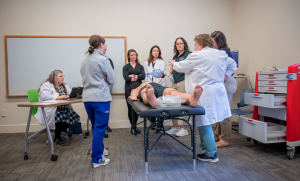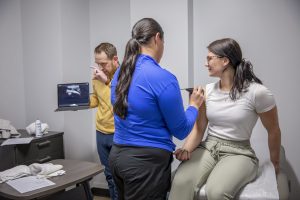 The Center for Interprofessional Learning and Simulation (CILS) at Daemen University hosted an interprofessional learning event for students in the Scott Bieler College of Health Professions on April 18, while also introducing new state-of-the-art technology.
The Center for Interprofessional Learning and Simulation (CILS) at Daemen University hosted an interprofessional learning event for students in the Scott Bieler College of Health Professions on April 18, while also introducing new state-of-the-art technology.
Nearly 20 students from the Physician Assistant Studies Department, Physical Therapy Department, and Nurse Practitioner Program spent the afternoon working in small teams.
“Interprofessional collaboration is now what healthcare has become – working together as part of a comprehensive team to help treat patients effectively and efficiently,” said Tony Surace, the executive director of the CILS. “The CILS helps provide that collaboration and experiential learning for students to learn and actually do the skills needed. If a mistake is made in the CILS, that is ok. Now is the time to do that and practice and refine those skills before they go out into the workplace.”
 Faculty provided demonstrations of the new Point of Care Ultrasound (POCUS) units, which are portable devices that provide imaging when and where it’s needed. Students also had the opportunity to use these handheld devices.
Faculty provided demonstrations of the new Point of Care Ultrasound (POCUS) units, which are portable devices that provide imaging when and where it’s needed. Students also had the opportunity to use these handheld devices.
Each team also worked with a new high-fidelity manikin. In this scenario, the patient simulator had just experienced a massive trauma and was in the ICU.
The manikin and POCUS units were recently purchased through a donation made by Scott Bieler – a member of the university’s board of trustees and the president and CEO of West Herr Automotive Group.
“The technology that we brought into the CILS due to the generous gift of Mr. Bieler is profound for our students,” said Dr. Greg Ford, the founding dean of the Scott Bieler College of Health Professions. “It provides them with state-of-the-art technology that they can take with them into practice as they leave Daemen University with their degree.”
Surace added, “Interprofessional education is so important for our students at Daemen as well as important for the future of healthcare. The CILS will provide the instruction and experience on
the new technology to prepare them for the future in the workplace.
The CILS serves as a regional resource for those in need of a space for professional development, which is crucial for employee retention and staying current with best practices in respective fields.









